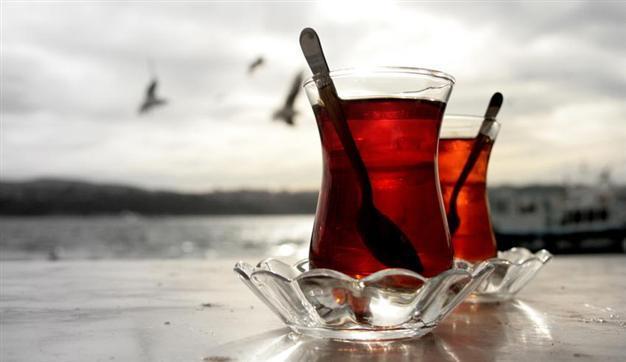Tea and serendipity
AYLİN ÖNEY TAN - aylinoneytan@yahoo.com
 How Turkey became a tea-drinking nation is one of the great miracles of the last century. It is hard to believe that almost a century ago, the tulip-shaped glasses glowing with coral-colored, hot, strong tea did not even exist in Anatolia.
How Turkey became a tea-drinking nation is one of the great miracles of the last century. It is hard to believe that almost a century ago, the tulip-shaped glasses glowing with coral-colored, hot, strong tea did not even exist in Anatolia.I cannot help but recall the tea growing in the Black Sea hills of Turkey while winding up roads uphill in Nuwara Eliya in Sri Lanka. Apart from occasional palm trees reminiscent of the tropics, and very dark-skinned Tamil women toiling over tea shrubs, I could have easily sworn I was a stone’s throw away from Rize, the epicenter of the tea-growing region in Turkey. We are on an expedition tour to Sri Lanka with a group of tour guides; myself to explore more about tea and spices.
As we share our knowledge on tea, one guide friend, Sinem Altuner, tells an anecdote of one of her tours in Turkey. She says the further south and east one goes, the better the quality of the tea, according to tourists. Once, a tourist specifically asked the waiter for the brand of the tea she tasted in Van. She then looked for it in all supermarkets. When Sinem herself glanced at the barely legible writing, she saw that the mystery brand was good old “Kaçak Çay,” simply translated as “smuggled tea.” In Turkey, smuggled tea, also known as Seylan çayı/Ceylon tea, is much praised for its strong taste and blood-red color. The term “smuggled” has a magic of its own; it adds mystery, thrill and adventure, and even a bit of sophistication by coming from faraway lands, to an otherwise ordinary glass of tea. I can imagine the proud expression of the waiter when revealing the source of their cup of tea, which he thought had an obvious higher value because it was smuggled.
I’m not sure if all “kaçak çay” in Turkey is actually Ceylon tea of Sri Lankan origin. However, the tea that is closest to the Turkish palate must be Ceylon tea. Though Turkey ranks high in tea growing, Turkish tea hardly has an international recognition. It is interesting to find out that the rise of tea cultivation in both countries has similarities and that the “discovery” of tea was an act of serendipity in those faraway lands.
According to the Oxford Dictionary, serendipity is “the occurrence and development of events by chance in a happy or beneficial way.” Serendipity itself is a word named after Sri Lanka, Serendip being one of the former names of the island, the one before the name Ceylon. A man of many talents and professions, art historian, politician, writer Horace Walpole had coined this word in 1754. Walpole used the word “serendipity” in a letter he penned, referencing the Persian fairy tale, “The Three Princes of Serendip.” For Walpole, the sensation created by “unexpected discovery” was of serendipity. Walpole marveled at the princes in the fairy tale, who were “always making discoveries, by accidents and sagacity, of things which they were not in quest of.”
It can easily be said that both Sri Lanka and Turkey were not in the quest for tea. It was a series of “the occurrence and development of events by chance in a happy or beneficial way” or simply “serendipity” that they became among the leading tea-growing countries, with Sri Lanka fourth and Turkey fifth in terms of the biggest producers of tea in the world. Both countries formerly had a history associated with coffee, with Sri Lankans growing coffee and Turks just consuming, enjoying their cup of Turkish coffee.
Tea is one of the foremost products of Sri Lanka, but just like Turkey, coffee production and consumption preceded the tea fad on the island. High demand for coffee led to clearing of rainforests and the so-called “coffee rush” was soon to be replaced by “coffee blight.” Coffee crops were ravaged by the fungal disease, referred to as “devastating Emily.” By the end of the 19th century, coffee production ceased to exist and the reign of tea began.
In the case of Anatolia, the meager financial capabilities of the newly founded Republic led to efforts to replace coffee with another “national drink.” On the directive of Prime Minister İsmet İnönü, tea cultivation found its ideal corner in the Black Sea region in the 1930s. Today, Turkey is third per capita in terms of tea consumption, right after England and Northern Ireland. Now in both countries, the hills of Nuwara Eliyah and Rize share a similar fate and strikingly similar landscapes, with tall ladies silently picking the finest teal leaves.
Bite of the week
Recipe of the Week: Tea deserves the good company of a nice cake. This fruit cake is a true tea cake, made with lots of strong brewed tea. Chop about 450 g of mixed dried fruit, and soak overnight in 275 ml of cold black tea and 150 g of brown sugar. Whatever fruit combination you like is OK – sun-dried apricots, prunes, dates, figs, raisins, sultanas, blackcurrants, cranberries, apples, peaches and mulberries would all work. You can adjust the amount of sugar according to the sweetness and tartness of the fruits you use. The next day, mix in two eggs, 250 g flour, one sachet of baking powder, a good pinch of salt and a heaping teaspoon of mixed spice. You can be more generous with the spice, and use a combination of ginger, cinnamon, mace, cloves, nutmeg and even some ground star-anise. If you can find true cinnamon from Sri Lanka, don’t skimp, use liberally. Pour into a prepared or lined loaf tin, and bake about 11/2 hours at 180 degrees Celsius. This cake will keep for ages if wrapped properly. Serve sliced thin with clotted cream or spread with sweet butter.
Crew of the Week: Turkish Airlines Colombo Airport crew deserves a special mention. Kind and gentle, they were extremely friendly and helpful to our group and generous with their warm Sri Lankan smile.












